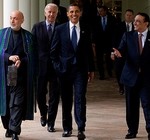Not even a fortnight has passed since the horrific assassination of Salman Taseer, Governor of the Punjab province of Pakistan. But not even all the outpourings of shock and regret at the cold blooded manner of his killing by his own fundamentalist bodyguard (in connivance with the rest of the detail) could delay business as usual. This is evident in the almost immediate reassertion of American interest in Afghanistan, and speaks volumes about what the killing revealed about the true state of affairs in Pakistan.
US Vice President Joseph Biden made a quick trip to Pakistan (Jan.12), Afghanistan and Baghdad in early January. He is known to be the principle proponent of the strategy of “declare victory in Afghanistan and go home” at the earliest. It suits the American presidential cycle. Unfortunately the reality on the ground in Afghanistan and in Pakistan is not in compliance with the US timetable. Biden’s visit was preceded by a quick visit by Frank Ruggiero, appointed to succeed the former special Af-Pak envoy, Richard Holbrooke, and followed by an unseemly dash to Washington by Pakistan’s peripatetic President Asif Zardari to attend a special memorial for Holbrooke. US President Barak Obama and Zardari are both scheduled to make official visits to each other’s capitals later this year.
What is being hatched up in these feverish exchanges? According to a Jan. 7 article by Karen de Young in the Washington Post, Biden was to seek a frank exchange of views and priorities with the Pakistanis, namely, Gen. Ashfaq Kayani, chief of the armed forces, in terms of the end game in Afghanistan and the long-term strategy for the region. The US administration seems to have accepted that Pakistan has an “important” if not “dominant” role to play in reconciliation talks with the Taliban. After ascertaining what “Pakistan needs, expects and demands” in return for more cooperation in the war, Biden was to offer a new package of assistance with military, intelligence and economic components.
Especially important for India to keep in mind is the expectation that there will be intensified intelligence-sharing between the US and Pakistan about India’s activities in Afghanistan. This somehow legitimizes Pakistani concerns about India’s presence in Afghanistan – despite President Obama’s assertion in his address to the Indian Parliament last November that “major development assistance from India has improved the lives of the Afghan people.”
As one unnamed official quoted in the Washington Post article says, the US administration has “got to increasingly try to look at this through their (Pakistani) lens.” This is accompanied by a clamour in the American intelligence community to resolve the Kashmir problem in order to encourage Pakistan to move more of its army to the western front and carry out an offensive against Al Qaeda in North Waziristan. In this line of thinking pressure needs to be brought to bear on India to make concessions on Kashmir to Pakistan.
This is very interesting logic as the needs and the desires of the Pakistani army are being conflated with those of the Pakistani people and the nation while those of India and Indians are being subordinated. The subliminal thought is also that placating the army and providing economic assistance will help to counter the increasing Islamic militancy reflected in the manner of Taseer’s killing, the inability to find even one cleric to perform his last rites and the resounding silence of his Party,the ruling Pakistan People’s Party and the so-called liberal elements of Pakistani society.
Unfortunately it is also the case that urban support for militancy cannot be attenuated by American largesse. According to a policy brief written last year for the Belfer Centre at Harvard University, Jacob N. Shapiro and Christine Fair found that there was no strong co-relation between support to militancy and levels of poverty and an absence of education. Nor was there a strong co-relation between support for Sharia law and militancy. More dismayingly there is no correlation between support for democracy and opposition to Islamism as became evident when literally hundreds of Pakistani lawyers showered Taseer’s assassin with rose petals.
How clueless the West can be about what is going on the ground was most recently seen in the uprising in Tunisia, which last week drove long-time dictator Zine el-Abidine Ben Ali into exile in Saudi Arabia. Just days earlier several French cabinet Ministers voiced support for the beleaguered government of their former colony. The new French foreign minister, Michele Alliot-Marie, went so far as to tell the National Assembly that French riot police could be offered to help restore order.
India must not allow itself to become a victim of American imperatives and Pakistani maneuvers. However the Home Secretary’s casual announcement at a seminar in Delhi this past weekend that the Indian government plans to cut para-military forces in the Kashmir Valley by 25% this year, is not reassuring in its timing. He also referred to a unilateral offer of multiple-entry, six-month, specially-designed travel permits so Kashmiris from India can cross the Line of Control into Pakistan-Occupied Kashmir. Why permits, and not Indian passports? A permit leaves nationality vague for Kashmiris – and is especially inappropriate given that we are in a loud argument with China over stapled visas for Arunachalis and the self-same Kashmiris.
Most Indians would like to see the problems of Kashmir addressed in a more focused and consistent manner. However what Kashmir needs is a Nitish Kumar-solution, not a caving-in to American pressure.
Neelam Deo is co-founder and Director, Gateway House: Indian Council on Global Relations; She has been the Indian Ambassador to Denmark and Ivory Coast; and former Consul General in New York.
This article was exclusively written for Gateway House: Indian Council on Global Relations. You can read more exclusive content here.
For interview requests with the author, or for permission to republish, please contact outreach@gatewayhouse.in.
© Copyright 2011 Gateway House: Indian Council on Global Relations. All rights reserved. Any unauthorized copying or reproduction is strictly prohibited.


